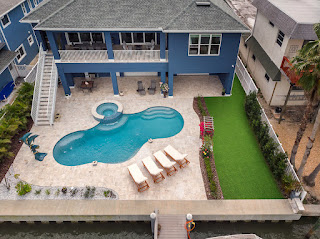Pools by Jordan largo fl : How to Choose the Perfect Pool Shape for Your Backyard
Choosing the ideal pool shape for your backyard is one of the most exciting yet challenging decisions in the pool design process. The shape you choose will impact not only the aesthetic of your outdoor space but also its functionality, cost, and how it blends with the surrounding landscape. Here’s a guide to help you find the perfect pool shape for your backyard that aligns with your style, budget, and practical needs.
1. Consider Your Space
Every backyard is unique, and the amount of available space plays a significant role in choosing the right pool shape. Smaller yards might benefit from space-efficient shapes like rectangular or oval pools, which maximize swimming area. Larger backyards, on the other hand, can accommodate more complex designs, such as L-shaped or freeform pools, which add aesthetic interest and versatility. For compact spaces, you might also consider plunge pools or narrow lap pools, as they fit into tight spaces without feeling cramped.
2. Think About the Pool’s Purpose
What will you primarily use your pool for? Your answer will help narrow down the best shape options for your needs:
- For Lap Swimming: If exercise is your priority, consider a long, rectangular pool. This shape provides a clear path for laps and allows efficient swimming space without obstacles.
- For Relaxation and Socializing: If you plan to use your pool for entertaining or family gatherings, a freeform pool or kidney-shaped pool may be ideal. These shapes create natural spaces for lounging, socializing, and adding features like built-in benches, tanning shelves, or swim-up bars.
- For Kids and Families: If you have young children or plan to host family gatherings, a rectangular or L-shaped pool offers plenty of shallow areas for safe play while providing enough space for adult swimmers. Some people also add zero-entry features, which mimic beach-like slopes for added safety and accessibility.
3. Harmonize with Your Landscape and Home Style
Your pool should blend seamlessly with your backyard landscape and architectural style. Different pool shapes suit different styles, so consider the following:
- Modern Homes: Clean lines and geometric shapes often complement modern architecture best. Rectangular or square pools create a sleek, minimalist look that enhances contemporary spaces.
- Traditional or Classic Homes: Curved shapes like the oval or kidney shape can add a soft, classic appeal that pairs well with traditional home styles. These shapes can be decorated with classic tile designs or stone coping for an elegant look.
- Natural or Tropical Landscapes: Freeform pools are ideal for backyards that emphasize natural, lush landscaping. With their irregular shapes and flowing lines, they mimic natural ponds or lagoons, adding a serene, resort-like atmosphere to your outdoor area.
4. Factor in Features and Add-Ons
If you have specific features in mind, like a spa, waterfall, tanning ledge, or seating areas, think about how these will work with the pool shape you’re considering. Rectangular pools can easily incorporate lanes, diving boards, or lap swimming areas, while freeform pools are more suited to natural, asymmetrical features like rock waterfalls and grottoes.
5. Consider Maintenance and Cleaning
The shape of your pool can also impact how easy it is to clean and maintain. Rectangular pools are usually easier to maintain since they have clear, straight lines that allow pool cleaning systems to navigate without obstacles. Pools with lots of curves, bends, or alcoves, such as freeform or kidney-shaped pools, may require extra attention to keep clean, especially if you have natural features like rocks or plants nearby.
6. Plan for the Future
If you plan on selling your home in the future, consider how your pool shape might affect your property’s appeal. Rectangular pools tend to have universal appeal and often increase property value, as they’re versatile and easy to work with. Unique shapes, like figure-8 or freeform pools, can add a personalized touch, but they may not appeal to everyone.
7. Budget Wisely
Finally, remember that the shape of your pool can impact the overall cost. Simple, geometric shapes like rectangles or squares are generally more affordable to design, install, and maintain. Pools with irregular shapes, such as freeform pools, require more customization, excavation, and possibly higher landscaping costs, which can make them more expensive.



.jpeg)
Comments
Post a Comment